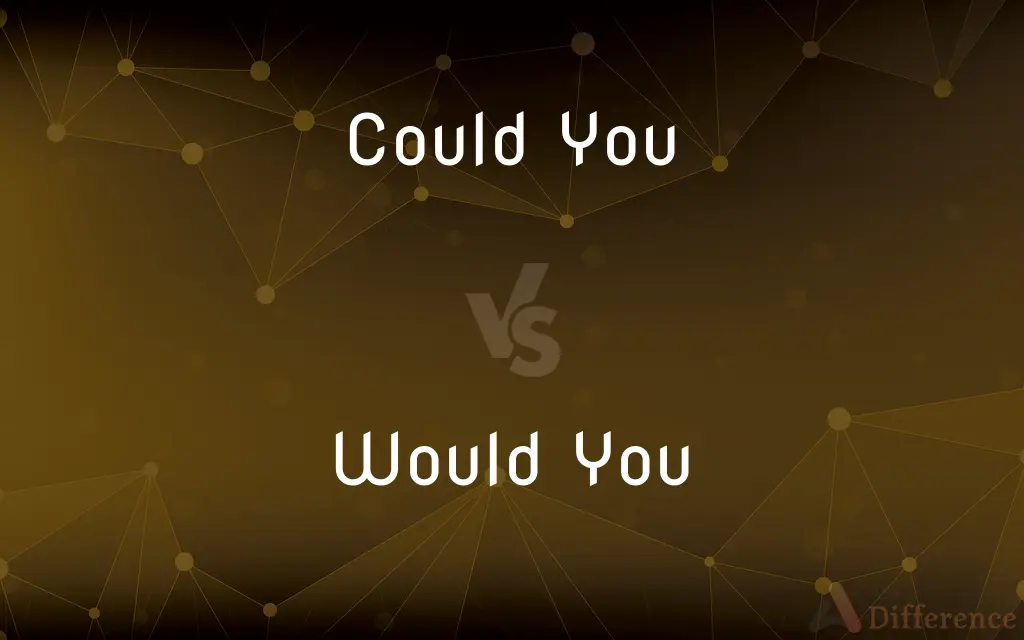Could You vs. Would You — What's the Difference?
By Tayyaba Rehman — Published on November 23, 2023
"Could You" requests capability or possibility, while "Would You" asks about willingness or preference.

Difference Between Could You and Would You
Table of Contents
ADVERTISEMENT
Key Differences
"Could You" and "Would You" are both polite ways to make requests or ask questions in English, but they differ in their nuances. "Could You" generally inquires about someone's ability or the possibility of doing something. When you ask, "Could you pass the salt?", you're essentially asking if the person is capable of passing the salt.
On the other hand, "Would You" often addresses someone's willingness or preference. Asking "Would you like some coffee?" is not questioning the person's ability to drink coffee but rather if they have a desire or preference for it at that moment.
In many situations, "Could You" and "Would You" can be used interchangeably without a significant change in meaning, especially in everyday conversational English. For instance, "Could you help me?" and "Would you help me?" both seek assistance, though the former emphasizes capability while the latter focuses on willingness.
While "Could You" tends to lean towards the possibility or capability, "Would You" is more about preference, desire, or consent. However, context plays a crucial role, and the meaning of these phrases can sometimes overlap based on the situation.
Comparison Chart
Primary Use
Capability or possibility
Willingness or preference
ADVERTISEMENT
Form
Modal verb of "can"
Modal verb of "will"
Typical Questions
Could you do that?
Would you like that?
Interchangeability
Often interchangeable, based on context
Often interchangeable, based on context
Context
More about ability or feasibility
More about desire or consent
Compare with Definitions
Could You
Seeking permission (informal).
Could you let me in?
Would You
Inquiring about willingness.
Would you join us?
Could You
Suggesting feasibility.
Could you try a different method?
Would You
Asking about preference.
Would you prefer tea or coffee?
Could You
Checking potential actions.
Could you check the mailbox?
Would You
Requesting a favor.
Would you hold this for a moment?
Could You
Inquiring about possibility.
Could you come tomorrow?
Would You
Seeking a decision.
Would you take the blue one?
Could You
Asking about capability.
Could you lift this box?
Would You
Proposing a hypothetical.
Would you do the same in my place?
Common Curiosities
Are "Could You" and "Would You" interchangeable?
Often, yes. But "Could You" leans towards capability, while "Would You" leans towards willingness.
Can both be used for polite requests?
Yes, both are considered polite ways to ask for something.
Which is more formal?
Both are polite, but neither is particularly formal.
How do they relate to "Can You" and "Will You"?
"Could You" is the modal past of "Can You", and "Would You" is the modal past of "Will You".
Are they both used in questions?
Primarily, yes. But they can also be used in statements, like "I was wondering if you could/would..."
Are there any common errors related to their usage?
Confusing them with their present counterparts "Can You" and "Will You" is a common error.
Can "Could You" be used for hypothetical situations?
It's more common to use "Would You" for hypotheticals.
Can "Would You" be used to offer something?
Yes, e.g., "Would you like some water?"
Which is more appropriate for formal requests?
Both are polite, but for very formal situations, more direct phrasing might be preferred.
Can they be used in both affirmative and negative contexts?
Yes, e.g., "Could you not shout?" or "Would you not go there?"
Can they be used in negative questions?
Yes, e.g., "Couldn't you try again?" or "Wouldn't you agree?"
Is one more commonly used than the other?
It depends on the context and the speaker's preference.
Can "Could You" be used to ask for advice?
Yes, e.g., "Could you tell me the best route?"
Can they be used for future actions?
Yes, especially when asking about future possibilities or preferences.
Are they used similarly in British and American English?
Yes, the usage is similar in both dialects.
Share Your Discovery

Previous Comparison
Cache Memory vs. Main Memory
Next Comparison
Controversy vs. ScandalAuthor Spotlight
Written by
Tayyaba RehmanTayyaba Rehman is a distinguished writer, currently serving as a primary contributor to askdifference.com. As a researcher in semantics and etymology, Tayyaba's passion for the complexity of languages and their distinctions has found a perfect home on the platform. Tayyaba delves into the intricacies of language, distinguishing between commonly confused words and phrases, thereby providing clarity for readers worldwide.












































